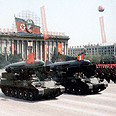
The international community is fearful that other countries may detect the UN’s weakness and launch nuclear programs of their own.
South Korea said it would “sternly respond” to North Korea’s alleged nuclear test, condemning it as a provocative act.
“South Korea cannot tolerate a test,” said presidential spokesman Yoon Tae-young. “North Korea should assume all responsibilities” for the fallout from a test, he said.
The United States refrained from relating directly to the test before the reports are verified, but it did condemn the act in principle and called for the Security Council’s immediate action.
The White House issued a statement referring to the test as a “provocation.”
Last week US Defense Secretary Donald Rumsfeld said a successful North Korean nuclear test would attest to the weakness of the international community.
China, one of North Korea’s only allies, also responded harshly to the nuclear test. The Foreign Ministry in Beijing issued a statement saying, “China staunchly objects to North Korea’s nuclear test and hopes it would return to the negotiations table.”
China hosted the talks held between North and South Korea, the US, Russia and Japan; the deliberations were suspended when the North Korea representatives walked out in protest of Washington’s policy toward the country.
Japanese Prime Minister Shinzo Abe, who arrived in Seoul Monday to discuss the region’s nuclear crisis with the South Korean president, said the nuclear test was an “unforgivable” act, and a spokesperson for the Japanese government said the test poses a grave threat to Japan and the entire region’s stability.
'Historic event'
Australian Prime Minister John Howard said his government would call on the United Nations Security Council to take "Swift and effective action" against North Korea, including financial, trade and travel sanctions.
"This issue represents a great challenge to the United Nations," Howard told Parliament.
"If the United Nations is to come up to scratch on this issue, it will win great respect and an enhanced reputation. But if the United Nations fails to act effectively against this outrage from North Korea, it will represent a further diminution of its authority," he said.
North Korea said Monday it has performed its first-ever nuclear weapons test, which would confirm that the country has a working atomic bomb as it has long claimed.
The country's official Korean Central News Agency said the underground test was performed successfully "With indigenous wisdom and technology 100 percent," and that no radioactive material leaked from that test site.
"It marks a historic event as it greatly encouraged and pleased the (Korean People's Army) and people that have wished to have powerful self-reliant defense capability," KCNA said. "It will contribute to defending the peace and stability on the Korean Peninsula and in the area around it."
Experts believe North Korea has enough plutonium to produce 4-12 nuclear bombs.
The US Geological Survey said it recorded a seismic event with a preliminary magnitude-4.2 in northeastern North Korea that coincided with the announced test.
South Korean intelligence officials said the seismic wave had been detected in North Hamkyung province, according to South Korea's Yonhap news agency. It said the test was conducted at 10:36 a.m. (9:36 p.m. EDT Sunday) in Hwaderi near Kilju city on the northeast coast, citing defense officials.
Although North Korea has long claimed it had the capability to produce a bomb, the reported test, if confirmed, would be the first proof of its membership in a small club of nuclear-armed nations. It would dramatically alter the strategic balance of power in the Pacific region and seriously undermine global anti-proliferation efforts.















